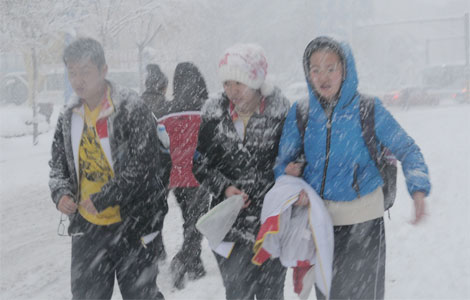

Interpreted as a mechanism for evacuation of Chinese nationals in time of possible conflict, the system caused consternation in both Chinese media and cyberspace on Monday, amid new tensions between Beijing and Tokyo over China's newly designated air defense identification zone, which covers the Diaoyu Islands in the East China Sea.
"It is international practice to conduct expatriate registration, and every country's diplomatic mission is obligated to protect its citizens in foreign countries," Foreign Ministry spokesman Qin Gang said at Monday's daily news conference.
The ministry has taken on heavy consular protection responsibilities as the number of overseas Chinese is rapidly increasing, he said.
The spokesman called the association of the registration with a possible evacuation "over-imaginative" and suggested that the public not read too much into the policy, which has been carried out by Chinese embassies in other countries.
"Providing consular protection and assistance for Chinese nationals is one of the major responsibilities of Chinese diplomatic missions overseas," the Chinese embassy in Tokyo said in an online statement, adding that registrants' privacy will be protected.
Qin said the ministry website had been revised recently. "Voluntary registration of Chinese expatriates, an important part of the updated content, is a demonstration of the government's awareness and capability to improve consular protection."
Not feeling friendly
Experts called the registration a normal embassy function aiming to serve Chinese nationals overseas. They warned against an unnecessary escalation of the current crisis between the two neighbors.
Wang Ping, a researcher of Japanese studies with the Chinese Academy of Social Sciences, said major emergencies mostly refer to natural disasters, as Japan is vulnerable to earthquakes, tsunamis and volcanic eruptions.
"The more information the embassy obtains about our citizens, the more effective and rapid assistance it will provide to our people when disaster happens," Wang said.
In another measure of the current bilateral animosity, a record 80.7 percent of Japanese "do not feel friendly" toward China, Japan's Kyodo News Agency reported on Saturday, based on an annual survey performed by Japan's Cabinet Office.
The number is 0.1 percentage point higher than the previous survey in 2012 and the highest since the poll began in 1978. On the flip side, those who "feel friendly" toward China rose 0.1 point to 18.1 percent, according to the survey, which was conducted from Sept 26 to Oct 6.
Experts said the figure has mirrored the tensions rising from the islands dispute and the two countries' differing perceptions of wartime history, which may cast a shadow over the development of bilateral relations and cause unwanted panic in face of normal policy.
But Wang from the CASS said that the survey, lacking a scientific basis, cannot fully and accurately reflect the real social sentiment.
"There might be a political agenda lying underneath the survey and its result might be made in favor of the government," he said.
Contact the writers at puzhendong@chinadaily.com.cn and caihong@chinadaily.com.cn
Zhang Fan in Beijing contributed to this story.







